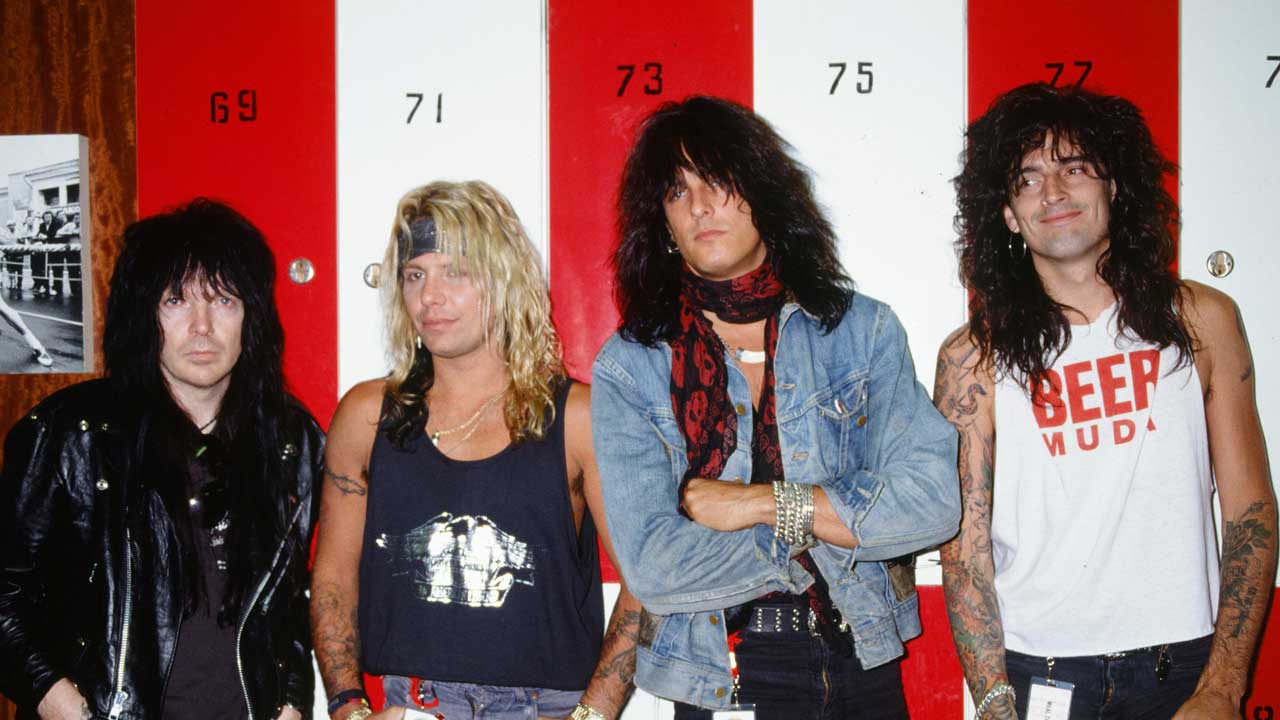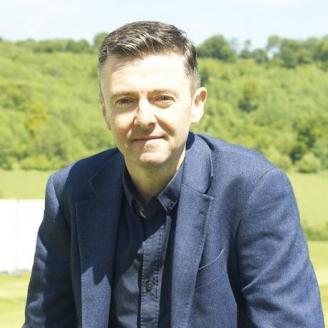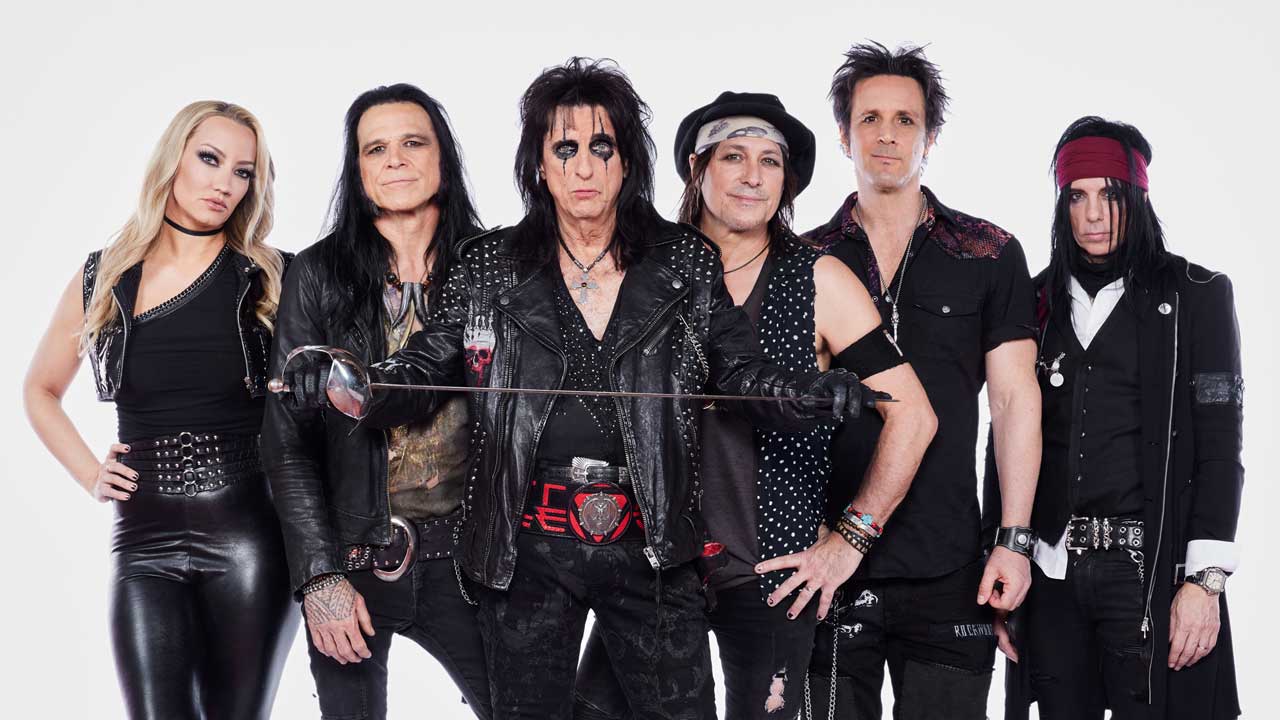How Mötley Crüe survived literally everything to make Dr Feelgood
Overdoses. Drug smuggling. Doppelgängers. Marriage. Divorce. Fights. Russians. Bryan Adams. Baywatch. Welcome to a year in the life of Mötley Crüe

Kensal Green. West London, 1989. The black limousine was very long. It was so long it took up three parking meters. It was so long I had to park around the corner. There, three other gleaming black monsters took up another nine parking meters.
Out of the cars had climbed four musicians, two ominous security men, one tour manager, one gopher and several record company representatives. Ladies and gentlemen, Mötley Crüe were in the building…
This is a story of excess. This is a story of a very large amount of sex and drugs and slightly less rock‘n’roll. This is a story about ODs, heroin, girls, guns, dopplegängers, marijuana smuggling and millions of dollars. This is a story about a band who took a limo each around London. Why? Because they were there. Why? Because they could.
Inside the building, which housed a photographer’s studio, the band were being attended to by make-up women and hair fixers. In 1989, the band had a very large amount of both make-up and hair. In guitarist Mick Mars’ case, both were freshly applied each morning. He looked like Nosferatu after an unspeakable night out. There was something on his head. It might have been alive once. It was certainly long and black, it was certainly some sort of hair, and it was almost certainly not his.
But then, Mick was old. Everyone knew that. He was born Robert Deal. He was also right out there. I introduced myself. He stared blankly for a while, so I tried again. He carried on staring, and I thought maybe he was a little deaf, so I spoke quite loudly, directly into his ear. Nada. Then the tour manager tried. After a few more minutes, I tried again. An impossibly long while, he looked up and said: “Hey bud. Just spacin’…”
Three years later, Mick would accidentally shoot his own girlfriend.
Vince Neil was in better shape. Sure, Vince was short, but he was tanned and had recently undergone surgery to correct a deviated septum, the condition occurring when the central cartilage that divides the nose disintegrates because of substance abuse. The surgery had slimmed down his face. He was smothered in tasty tatts and he sported an enormous gold Rolex watch that had diamonds to mark the position of the numbers on the dial.
Sign up below to get the latest from Classic Rock, plus exclusive special offers, direct to your inbox!
His real name was Vince Wharton. He was 27 years old and married to a former mudwrestler called Sharise Ruddell. He was also a typical Californian, laid back and sunny and woozy and in possession of a disturbingly vague worldview. We had a bit of a pass-the-time chat about a recent charity show that Crüe had played in Moscow.
“Shit man, do you know how fuckin’ far it is to Moscow? It’s fuckin’… It’s…”
He searched for an adequate description of the length of the flight. “It’s fuckin’… far man.”
He was sitting next to Tommy Lee, and even Tommy was laughing at Vince’s struggle.
“Anyway, we kicked their asses. We really rocked those… those…”
Vince was trying hard to remember who he’d ‘rocked’.
Tommy thought for a second and then said: “Those Russkies!”
“Yeah! Yeah! Those fuckin’ red guys. Those Russkies. We kicked their asses. They don’t have much over there. Just like, fuckin’… dustbins man…”
Tommy and Nikki were different. They were genetic celebrities. They stuck god knows what down themselves at every opportunity and they looked inversely incredible. Tommy’s given name was Tommy Bass. His mother had been Miss Greece in 1957. He had honey-coloured skin, ultrabrite teeth, lustrous hair and a fat-free rock body. He was funny and genial, achingly handsome and married to Heather Locklear, the television über-babe.
Nikki’s real name was Frank Ferrano. He was big and muscly and similarly complexioned. His father was Sicilian, his mother from Idaho. He was a rockstar writ large and there was little doubt that he ran the band. He wrote most of the songs and devised their image. He was involved with a model, Brandi Brandt, after breaking up with Prince’s former protegé, Vanity. He had also, by his own admission, been an enthusiastic drug user for years.
Tommy was yelling about his problems with Heather to anyone who wanted to listen. She suspected that he’d slept with someone else. “No way man. But she’s bustin’ my ass!”
“Man,” said Nikki. “It’s a bummer getting busted for a boner you never even had…”
Things weren’t necessarily going to run smoothly. In fact, things could, at any time, run extremely badly. Mötley Crüe, and particularly Nikki, were very pissed off with me and Kerrang!, the magazine I worked for because we’d run a story about a man from Pennsylvannia who claimed that he had impersonated Nikki Sixx for a series of shows in 1983 after the bassist had been in a car crash.
The man’s name was Matthew Trippe. He was a slow and simple soul who’d been in and out of mental institutions and had his own problems with drug abuse. His ‘evidence’ included a series of reminiscences, shots from a tour-book that showed a suspiciously short Nikki Sixx (almost as short as Vince), several different pictures of navels, and other circumstantial stuff.
In 1988, he’d filed suit against Mötley Crüe and their management, citing civil theft and claiming that he had written a series of songs later recorded by the band, including Knock Em Dead Kid, Girls Girls Girls, All I Need, Dancing On Glass and Wild Side.
It was exactly the sort of thing that should happen to Mötley Crüe. After all, other stuff like this happened to them all the time. Their manager, Doc McGhee, had been convicted of smuggling 40,000 lbs of marijuana into Carolina. Part of his ‘punishment’ involved setting up an anti-drugs organisation, which he called ‘Make A Difference Foundation’. MAD for short.
It was the Foundation’s show in Moscow that had Vince travelling so ‘fucking… far’ to attend. Finally there, Tommy Lee got into a fist fight with Doc McGhee because Bon Jovi had got to use stage pyros and Mötley Crüe hadn’t. The band subsequently sacked McGhee.
Vince Neil was responsible for a car crash which had killed Hanoi Rocks drummer Razzle. He was convicted of vehicular manslaughter and sentenced to 30 days in jail.
Mick Mars had tried to explain away the cancellation of an entire British tour (because the band were too drug-addled to come) by saying that there was “too much snow on the roof” of one venue, and that it might collapse under the weight of the Crüe’s equipment. Vince had bought Tommy an AK-47 machine gun for Christmas.
Matthew Trippe was one more out of left field for a band who’d set up camp there. It was a terrific, if ludicrous, story. Nikki hated it, but then he missed the point. Matthew Trippe was funny. Matthew Trippe was dumb. Matthew Trippe was rock‘n’roll. Matthew Trippe was very Mötley Crüe indeed.
In the week that Mötley Crüe had flown into Britain, their fifth record, Dr Feelgood, was the No.1 album on the US Billboard charts. They were out of rehab and about as close to the top as it was possible to get without being Elvis himself.
The band weren’t overnight sensations, though. They’d all been in LA in the early 80s, trying to get something - anything - going. Mick Mars was placing ‘guitarist seeks band’ ads in the local press. Vince was fronting bar bands. Nikki had been in the band London with Blackie Lawless. London would go on to cult status for all of the wrong reasons: they became a clearing house for new-to-town rock stars, while never making it themselves.
Mötley Crüe had issued their first album, Too Fast For Love, on their own label, Leathur, and then ascended steadily through releases like Shout At The Devil, Theatre Of Pain and Girls, Girls, Girls. Their first big hit had come with a cover of Smokin’ In The Boys Room from Theatre Of Pain.
While the records were loud loud and undemanding party metal, Van Halen without the licks, where Mötley Crüe proved brilliant was in their overall concept. They nailed the sleazy image; they looked cool, cartoonish and larger than life.
And they also had the wit and the ingenuity to keep moving: Shout At The Devil featured a pentagram, a song called God Save The Children Of The Beast and hints of Satanic dabblings - always a winner. Theatre Of Pain was all polka-dots and pouts. Girls, Girls, Girls was a true flowering: great hair, tattoos, tans, fabulous and pneumatic women. The record captured the times, it blew out of strip clubs, kids’ cars and dumb movies. It went on heavy rotation on radio and MTV. As they prepared to follow up the album, Mötley Crüe were poised for the really big time.
Underpinning it all was an honesty that people responded to. While the music was standard, it came from a genuine lifestyle. The band really did dress this way, act this way, live this way. It was real, and it inspired and encapsulated a generation of bands. This was their true achievement.
But the drugs were a real problem, for Nikki Sixx in particular. At the end of 1987’s Japanese tour, Nikki left the rest of band as they went home to the US and stopped off in Hong Kong with Doc McGhee and the well-known Japanese promoter Mr Udo. They went to see a hokey fortune-teller, who said that Nikki would die before the end of the year if he didn’t reform his lifestyle.
Nikki travelled back to Los Angeles. Soon after, he went to the Cathouse, the famous Sunset Strip bar run by MTV presenter Rikki Rachtman and Taime Down of Faster Pussycat. He took Slash with him in his limo. Sixx began asking around dealers for some heroin and someone showed up at the Franklin Plaza hotel, where the pair had taken a room after leaving the Cathouse. Slash passed out while Sixx took some heroin.
He collapsed and was found by Guns N’ Roses drummer Steven Adler, who’d arrived with Slash’s girlfriend. Adler, a drug user himself, immediately realised that Sixx had OD’ed and dragged him into the shower. Adler was wearing a cast on his arm after an accident, and he hit Sixx with it, trying to keep him conscious for the paramedics. They arrived a little later, but Sixx was clinically dead. He was removed, with a sheet over his head. He remained that way for some minutes, until an adrenalin jab shocked his system back to life.
Nikki later remembered having what he described as an out-of-body experience, looking down on himself in the ambulance. He also started taking heroin again.
Mötley Crüe carried on. They were touring hard, taking Guns N’ Roses with them for Guns’ first major tour. But they had almost a decade of abuse behind them, and were slowly running out of control. In Japan, there were ugly stories about a band at breaking point. Then came the cancelled tour of the UK. The Girls, Girls, Girls tour ended, and the band went into rehab once again.
“It was either stop or it was the end of the band,” Vince Neil remembered. “It was something I had to do in order to put out another album and go back on tour. Take four guys and give them that much alcohol and drugs for 10 years and watch what happens. It got way out of hand.”
Plans were made to record a new album, their fifth, and to do it out of Los Angeles, away from temptation, away from the constant stream of visitors to the studio. An alcohol and drug rehabilitation specialist, Bob Timmins, had cleaned the band up. They went into pre-production in LA, but recording was to take place in Vancouver, with producer Bob Rock.
Vince Neil was convinced that working in Vancouver would be a major advantage. “It’s going to turn out a lot better because there’s so many distractions in LA. You don’t get any work done.”
“It won’t be such a grind,”Tommy Lee reasoned. “And we won’t be wearing out the sound of the record by playing it for 80 people who stop by. We don’t know anyone there. It’s perfect.”
News began to leak out about the tracks the band were writing. They had demoed over 20, including, it was said, a song called Sex, Sex And Rock’n’Roll (a new statement of intent?), another titled Say Yeah, about the Matthew Trippe case, plus Stop Pulling My Chain, Brotherhood, Too Hot To Handle and Rodeo.
While the plan to stay entirely hidden away in Vancouver didn’t quite come off (the band jammed onstage with Skid Row, and Cheap Trick and Bryan Adams also dropped by. All played small parts in the recording, too), they had certainly rededicated themselves to their music. On American radio, Vince Neil told Don Kaye: “We worked every single day on songs and cut out the ones we didn’t like. Every single one of them (that is left) is great.”
That much was evident from the songs he mentioned. Few were the same as the titles leaking out of the original sessions: Don’t Go Away Mad, She Goes Down, Same Ol’ Situation, Rattlesnake Shake and two ballads, Without You and Time For Change. The band’s new work ethic didn’t dent the character of their music, it was still loud and brash, packed with attitude and its most emblematic moment would prove to be Kickstart My Heart, the tune that Nikki Sixx wrote about his overdose and spectacular adrenaline-induced recovery. Sixx had turned a horrid low into a productive highpoint, an accurate miniature of the broader picture.
The Dr. Feelgood tour played two million people in 14 countries. The tour cost $325,000 a week to run. Each band member went home with over $8 million after commissions. There were some bumps along the way, but nothing like the lurching disaster movie that the drinking, drugging years had promised. Just the usual, very Mötley Crüe things: The Moscow shows were the first the band had played sober. Who knows where Vince may have thought he was if he’d been high…
Nonetheless, they ended their association with Doc McGhee after the pyro-Bon Jovi fiasco.
Vince Neil punched Izzy Stradlin’ of Guns N’ Roses at the 1989 MTV Awards (the Motley man wrongly thought izzy had been trying to pick up his wife a few weeks earlier), beginning a lengthy feud between the bands. Interviewed on MTV, Vince challenged W Axl Rose to a fight. Eddie Van Halen and Sammy Hagar slyly offered to promote a fight between the two at Madison Square Gardens. It never happened.
Vince threw his bed out of the window of a German hotel. It landed on two Mercedes in the car park. Tommy Lee was charged with disorderly conduct after exposing his buttocks to the crowd in Cincinatti, Ohio. Tommy Lee divorced Heather Locklear and married Baywatch actress Pamela Anderson. We know what happened next. Nikki Sixx married another Baywatch actress, Donna D’Errico. Mick Mars married and divorced one of the Nasty Habits, the band’s backing singers on the Dr Feelgood tour.

Kensal Green, 1989: Although the Matthew Trippe story had pissed Nikki Sixx off badly, he confined his comments to a hissed and pointed “people like you write shit about us…” when we spoke after the band’s photo session. He wagged a fist, too. That was not quite the end, though. Matthew Trippe did pursue his case for some time, but it proved futile. He dropped it in 1993. It was fun while it lasted, but he was no ‘Nikki Sixx’.
After the Dr. Feelgood tour finished, Mötley Crüe did some press in London, and one of their tasks was reviewing the singles at the magazine’s office. Nikki showed up - in a limo of course - with a baseball bat. One of the songs under review was a single by Fish. The reviewer told Nikki that I was a fan. When I arrived at my desk the next morning, there it was, smashed in half with Nikki’s bat.
“Dear Jon,” he’d written on it. “You’re next. Nikki Sixx”.
This feature was originally published in Classic Rock 25, in March 2001.
Jon Hotten is an English author and journalist. He is best known for the books Muscle: A Writer's Trip Through a Sport with No Boundaries and The Years of the Locust. In June 2015 he published a novel, My Life And The Beautiful Music (Cape), based on his time in LA in the late 80s reporting on the heavy metal scene. He was a contributor to Kerrang! magazine from 1987–92 and currently contributes to Classic Rock. Hotten is the author of the popular cricket blog, The Old Batsman, and since February 2013 is a frequent contributor to The Cordon cricket blog at Cricinfo. His most recent book, Bat, Ball & Field, was published in 2022.

